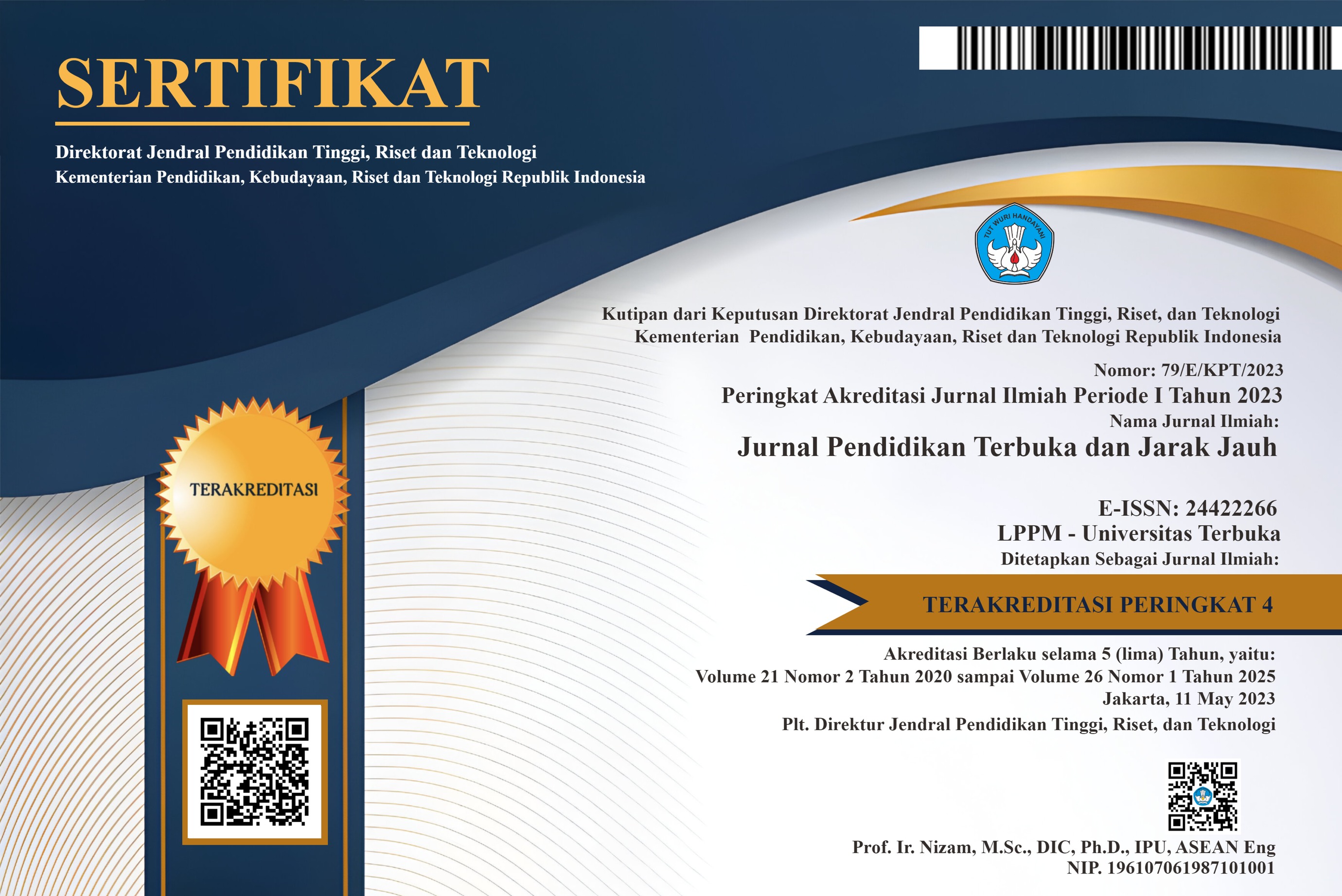The Development Process of Innovation of Accounting Cycle Simulation
DOI:
https://doi.org/10.33830/ptjj.v24i1.4266.2023Keywords:
accounting cycle simulation, accounting learning, virtual reality, gamificationAbstract
Basic accounting learning is about the accounting cycle. One of the competency achievements of undergraduate accounting students is to be able to understand the accounting cycle and make financial reports. However, not a few accounting students who when they graduate from the course still do not understand the accounting cycle and make financial reports, especially with the open distance learning system. This paper aims to create learning innovations about the accounting cycle so that students easily understand the accounting cycle and can make financial reports. This learning innovation uses virtual reality and gamification technology. The methods used in this study is research and development study and ADDIE model used to the development model. The result of this study is the development of innovation of accounting cycle simulation can make more interesting and easier to understand about accounting cycle learning for student.
References
Aini, Q., Hariguna, T., Putra, P. O., & Rahardja, U. (2019). Understanding How Gamification Influences Behaviour in Education. International Journal of Advanced Trends in Computer Science and Engineering, 8(1.5), 269-274.
Alcivar, I., & Abad, A. G. (2016). Design and evaluation of a gamified system for ERP training. Computers in Human Behavior, 58, 109-118.
Carnegie, G., Parker, L., & Tsahuridu, E. (2020). It's 2020: What is Accounting Today? Australian Accounting Review, 31(96), 65-73.
Cechella, F., Abbad, G., & Wagner, R. (2021). Leveraging learning with gamification: An experimental case study with bank managers. Computers in Human Behavior Reports, 3(100044), 1-9.
Elmqaddem, N. (2019). Augmented Reality and Virtual Reality in Education. Myth or Reality? International Journal of Emerging Technologies in Learning (iJET), 14(3), 234-242.
Fauzia, T., Afni, Z., & Santi, E. (2021). Konten Kurikulum Akuntansi Perguruan Tinggi Dan Kesesuaiannya Dengan Standar Kompetensi Lulusan. Jurnal Akuntansi dan Manajemen, 16(2), 168-190.
Hamari, J., Shernoff, D. J., Rowe, E., Coller, B., Asbell-Clarke, J., & Edwards, T. (2016). Challenging games help students learn: An empirical study on engagement, flow and immersion in game-based learning. Computers in Human Behavior, 54, 170-179.
Huang, R., Ritzhaupt, A. D., Sommer, M., Zhu, J., Stephen, A., Valle, N., . . . Li, J. (2020). The impact of gamification in educational settings on student learning outcomes: a meta-analysis. Education Tech Research Dev, 68, 1875-1901.
International Accounting Education Standards Board. (2019). Handbook of International Education Pronouncements. New York: International Federation of Accountants.
Kasurinen, J., & Knutas, A. (2018). Publication trends in gamification: A systematic mapping study. Computer Science Review, 27, 33-44.
Kimmel, P. D., Weygand, J. J., Kieso, D. E., Trenholm, B., Irvine, W. & Burnley, C. D. (2020). Financial Accounting: Tools for Business Decision-Making. Canada: Wiley.
Koivisto, J. & Hämeenlinna. (2020). Digital Simulations in Healthcare Education. Encyclopedia of Education and Information Technologies, 564-573.
Koivisto, J., & Hamari, J. (2019). The rise of motivational information systems: A review of gamification research. International Journal of Information Management, 45, 191-210.
Lee, S. H., Sergueeva, K., Catangui, M., & Kandaurova, M. (2017). Assessing Google Cardboard virtual reality as a content delivery system in business classrooms. Journal of Education for Business, 92(4), 153-160.
Legaki, N.-Z., Xi, N., Hamari, J., Karpouzis, K., & Assimakopoulos, V. (2020). The effect of challenge-based gamification on learning: An experiment in the context of statistics education. International Journal of Human-Computer Studies, 144(102496), 1-14.
Maydiantoro, A. (2021). Model-Model Penelitian Pengambangan (Research and Development). FKIP Universitas Lampung.
Mcgovern, E., Moreira, G., & Luna-Nevarez, C. (2019). An application of virtual reality in education: Can this technology enhance the quality of students’ learning experience? Journal of Education for Business, 95, 1-7.
Murtanto, Astuti, C. D., Yanti, H. B. & Noor, I. N. (2022). Kepuasan Pengguna Jasa Lulusan. Jurnal Akuntansi Trisakti, 9(2), 269-282.
Ramadan, R., & Widyani, Y. (2013). Game development life cycle guidelines. 2013 International Conference on Advanced Computer Science and Information Systems (ICACSIS), (pages 95-100).
Stapa, M. A. & Mohammad, N. 2019. The Use of ADDIE Model for Designing Blended Learning Application at Vocational Colleges in Malaysia. 2019. Asia-Pacific Journal of Information Technology and Multimedia Jurnal Teknologi Maklumat dan Multimedia Asia-Pasifik, 8(1), 49 – 62.
Stroud, D., Evans, C. & Weinel, M. 2020. Innovating for Energy Efficiency: Digital Gamification in The European Steel Industry. European Journal of Industrial Relations, 26(4), 419-437.
Universitas Terbuka. (2022, November 4). Data Mahasiswa per semester. Retrieved from sipelapor.ut.ac.id
Wahyu, S. (2022). Penerapan Metode Game Development Life Cycle Pada Pengembangan Aplikasi Game Pembelajaran Budi Pekerti. SKANIKA: Sistem Komputer Dan Teknik Informatika, 5(1), 82-91.
Vesa, M. & Harviainen, J. T. (2019). Gamification: Concepts, Consequences, and Critiques. Journal of Management Inquiry, 28(2), 128–130.
Xi, N., & Hamari, J. (2019). Does gamification satisfy needs? A study on the relationship between gamification features and intrinsic need satisfaction. International Journal of Information Management, 46, 210-221.
Zainuddin, Z., Chu, S. K., Shujahat, M., & Perera, C. J. (2020). The impact of gamification on learning and instruction: A systematic review of empirical evidence. Educational Research Review, 30(100326), 1-23.
Downloads
Published
How to Cite
Issue
Section
License
Copyright (c) 2023 Eka Wirajuang Daurrohmah

This work is licensed under a Creative Commons Attribution-ShareAlike 4.0 International License.





